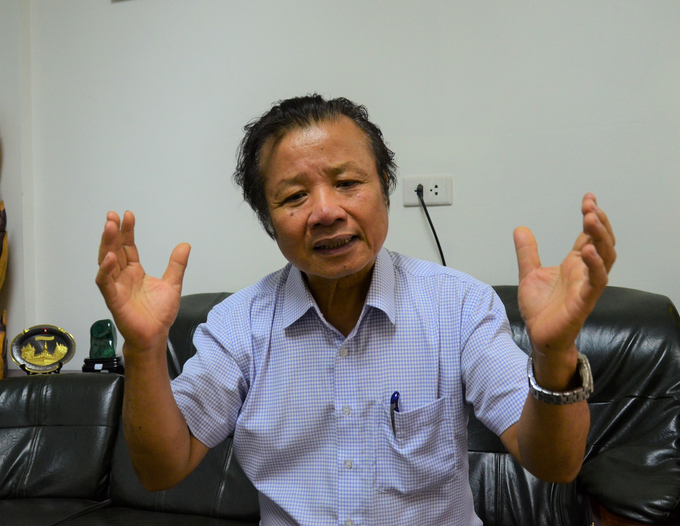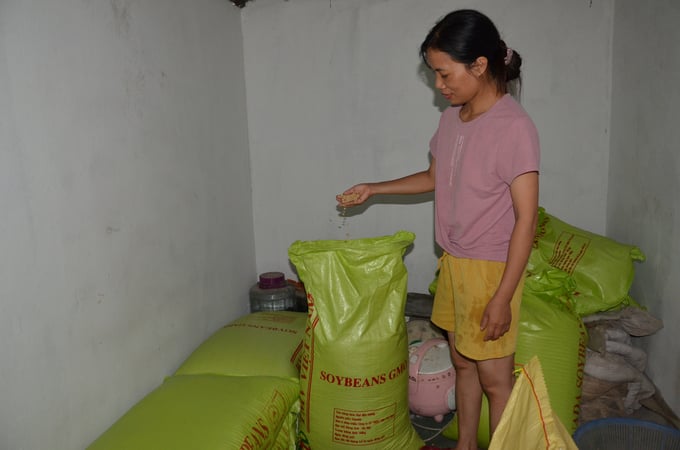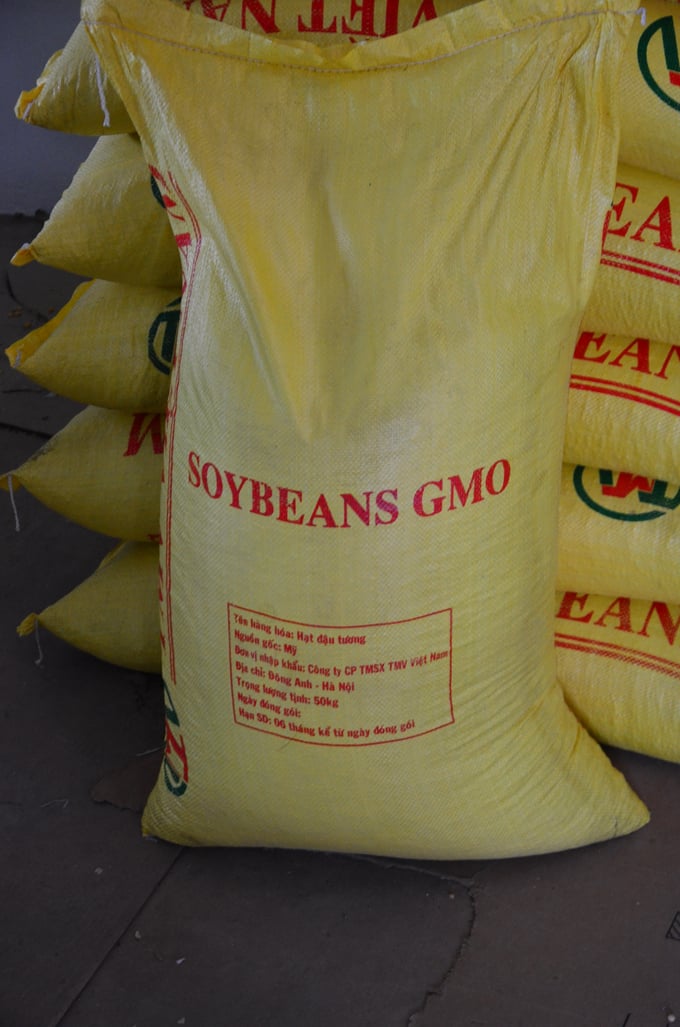May 25, 2025 | 09:12 GMT +7
May 25, 2025 | 09:12 GMT +7
Hotline: 0913.378.918
May 25, 2025 | 09:12 GMT +7
Hotline: 0913.378.918
Dear sir, why do you think there are many regulations on labeling genetically modified food (GMO food) but they are difficult to implement?
The implementation of labeling for genetically modified foods is not easy due to many reasons: The cost of building and operating a system of laboratories on a national scale for testing GMO food; the system for collecting samples from the market; the system of coercion and punishment for fraud.
Foreign experts estimate that if labeling is implemented, the cost of products can increase by 10 - 12%. The consumer would have to bear with that change. In fact, the GMO foods we import are mainly corn and soybeans for animal feed. Packaged processed products from these ingredients are also not much available in supermarkets or markets.

“Information transparency is a blessing for consumer’s daily life," said Prof. Le Huy Ham, former Director of Agricultural Genetics Institute (AGI). Photo: Duong Dinh Tuong.
Humanity has been using GM foods since 1996. After nearly 30 years, there has been approximately 3 billion ha of genetically modified crops. Tens of billions of tons of products have been made and consumed. All rumors about genetically modified products causing allergies, cancer, or infertility are not scientifically confirmed. Management authorities should not rely on rumors but instead scientific information to make and implement policies.
Instead of labeling the final product, why don’t we label the input material with GMO ingredients? Are importers being dishonest between GMO and non-GMO materials, sir?
According to the Cartagena Protocol on Biosafety, when one country wants to bring GMO products to another country, it must notify and be accepted by that country. I believe big manufacturers in European and American countries strictly follow that regulation.
There are currently two lines of GMO and non-GMO soybean products imported into Vietnam. At the input end, transparency can be easily achieved through declarations and inspections. The number of samples there is not too much and it is possible to take samples for analysis (each analysis costs VND 4 - 5 million).
But what about after importing the goods? How do we control to ensure transparency from processing to delivering the products to consumers? Those are hard questions. On the one hand, people must know which products are genetically modified and which are not, and on the other hand, the products must be managed so that they are safe and able to satisfy the market’s needs.

Many facilities use soybeans with the word “GMO” on the package but do not know that it is genetically modified products because there is no translation in Vietnamese. Photo: Duong Dinh Tuong.
Recently I went to 3 tofu craft villages, the ones with Mo tofu, Vong La tofu in Hanoi and the “hunchback” tofu in Bac Ninh. I saw that tofu makers were all using soybeans imported from Canada and the USA, suspected to be genetically modified products based on the price and printing on the package. What are your thoughts about this matter?
That situation is indeed happening! A few years ago, I was walking on the street near Thang Long Bridge in Hanoi and saw a person on a motorbike carrying packages of soybeans with the words “GMO” on it, so I chased after them to take pictures because I was working on that field.
Imported non-GMO soybean costs VND 24,000 - 26,000/kg, imported GM soybean is VND 16,000 - 18,000/kg. Meanwhile, traditional native soybeans have to be VND 36,000 - 38,000/kg, not to mention it is difficult to buy in bulk. To tell the truth, approximately 80% of the world's soybean output is GMO. As for the non-GMO portion, the producing countries mainly store them for domestic consumption. Such a high price difference is the reason why producers and tofu makers are prone to choose genetically modified soybeans as their input.

People are unaware of the fact that they are using GMO products because the package only states “GMO” but has no explanation in Vietnamese. Photo: Duong Dinh Tuong.
Do people not know that we have been acquainted with GMO products for decades and still think it is on the other side of the hemisphere?
Imported soybeans and corn are mostly GMO because countries with corn and soybean exports all plant GMO crops in a very large area. If you order a non-GMO product, it is still possible to buy it but at a much higher price. GMO crops have been around since 1996, when our country strongly developed livestock production. We had no choice but to import animal feed.
In fact, imported GMO products are mainly used for animal feed production, while packaged processed products using corn and soybeans are still few, mostly tofu, soy milk, corn milk, powdered milk, corn kernels and dried soybeans. The new labeling is only done for food products exported to countries as required and some self-declared organic food products in the country.

Making tofu in Tra Lam, Bac Ninh. Photo: Duong Dinh Tuong.
I truly believe that consumers should be known about the things they eat, whether GMO or non-GMO. What about you, sir?
I totally agree because that is their legitimate right. Information transparency is a blessing for consumer’s daily life, but in reality it is not always possible to do so. In my opinion, there are current issues that are more important than GMO, such as: whether agro-products sold in supermarkets use pesticides, if they do, then which types; when the pesticides were last used; the agro-products are domestically produced or imported from somewhere.
In other industries such as healthcare, GMOs are actually common. Is the Covid-19 vaccine we just injected considered a GMO product?
You are correct. Many medicinal products are derived from recombinant DNA technology, so in a way, it is a GMO product. It's a man-made GMO, and in fact, genetic modification in nature still happens frequently in our daily lives. For example, sweet potato varieties in Asia and Africa all carry foreign genes, which means they have been genetically modified for many generations.
People are wary of GMO products because they are man-made genetic modifications. In the near future, gene editing can be applied to enhance the expression of a gene or to silence a gene that is no longer expressed. This technology has won a Nobel Prize and is going to explode soon because many countries do not consider it GMO and will skip the safety evaluation steps.
Thank you, sir!
Translated by Samuel Pham

(VAN) The People's Committee of Tra Vinh province has approved an adjustment to the investment policy for the Green Hydrogen Plant project, increasing its area to approximately 52.76 hectares.
![Reducing emissions from rice fields: [2] Farmers’ commitment to the soil](https://t.ex-cdn.com/nongnghiepmoitruong.vn/608w/files/news/2025/05/05/dsc08881jpg-nongnghiep-140632.jpg)
(VAN) Clean rice cultivation model in Thuong Tan commune, Bac Tan Uyen district, is assisting local residents in achieving sustainable agriculture by substantially reducing costs, increasing productivity, and protecting the environment.

(VAN) At the conference to disseminate Resolution No. 68, AgriS introduced its digital agricultural ecosystem and reaffirmed its commitment to accompanying the Government in promoting private sector development and sustainable agriculture.

(VAN) 'Blue Ocean - Blue Foods' initiative is designed to restore marine ecosystems and establish sustainable livelihoods for local communities by cultivating a minimum of 1,000 hectares of cottonii seaweed in the first three years.
/2025/05/21/4642-3-112707_603.jpg)
(VAN) The V-SCOPE project has made direct contributions to three out of six pillars of the Comprehensive Strategic Partnership between Vietnam and Australia.

(VAN) Facing the threat of rabies spreading to the community, Gia Lai province urgently carries out measures to vaccinate dogs and cats on a large scale.

(VAN) Disease-free livestock farming not only protects livestock herds but also stabilizes production and livelihoods for many farmers in Tuyen Quang.